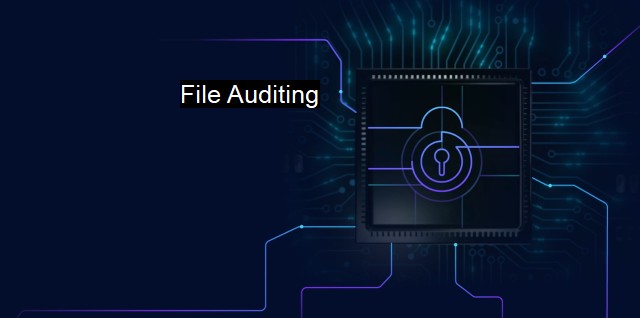What is File Auditing?
Securing Your Information: The Basics of File Auditing, Antivirus, and Benefits for Organizations
File auditing, in the context of cyber security and antivirus, is a systematic tracking and review of the changes, accesses, and activities related to files and directories within a system. This process is crucial in ensuring the security, integrity, and availability of data. It involves monitoring and recording file-level events such as who accesses certain files, when they access them, which files they interact with, and what actions they perform on them. File auditing software facilitates tracking these activities and in identifying suspicious behaviors that could possibly lead to data breaches or violations of data privacy policies.File auditing serves various purposes. Many organizations are required by law or regulations to carry out regular file audits. These requirements aim at ensuring companies are accountable for the confidential data they handle and use, and they safeguard it against unauthorized access and malicious attacks. Laws such as the General Data Protection Regulation (GDPR) in Europe and the Health Insurance Portability and Accountability Act (HIPAA) in the U.S. necessitate regular file audits to prove compliance. Non-compliance can result in significant fines and legal penalties.
With the increasing sophistication of cyber threats, file auditing has gained significant importance. It facilitates the detection of unauthorised activities and malicious changes. When a file audit is properly configured, it helps to deter, detect, and mitigate threats by providing visibility and accountability of access to sensitive data. By monitoring and recording activities within files, auditors can identify if a potential security breach is taking place and stop it before it does any damage.
File auditing aids in forensic investigation. In case of a security breach, auditors rely on log files produced by file auditing software to carry out an audit trail. It enables them to understand how the breach occurred and to identify the specific vulnerability that was exploited. With this data, the organizations can employ countermeasures to prevent future breaches, while also cooperating with law enforcement, where required, to bring perpetrators to justice.
Until recently, many organisations only implemented antivirus software to deter attackers,plunging into a reactive approach to security. While antivirus is effective to an extent, it usually works by comparing files to a database of known threats, becoming vulnerable to zero-day attacks and skilled hackers who can disguise malicious activities. A proactive approach with file auditing complements an antivirus program, creating an active security defense system. With antivirus addressing known threats and file auditing helping to detect and understand new ones, an organisation stands a strong chance of maintaining data integrity.
Setting up file auditing requires several steps. Firstly, one needs to decide what needs to be audited. This could be a specific drive, a few key folders, or the entire file system. Then, through software or operating system settings, the administrator would then define what the system considers an auditable event - file access, creation, deletion, or modification for example. The more events you chose to monitor, the more intensive the process becomes, potentially slowing down the system. Therefore, it's a delicate balance to maintain the system's performance while ensuring sufficient security.
File auditing in the context of cybersecurity and antivirus is critical in monitoring, recording, and analyzing file-system events. It bolsters risk mitigation strategies, regulatory compliance, and sustains a robust proactive security posture, complementing tools like antivirus software. Invest in regular file auditing contemporary times, the importance of file auditing in safeguarding organizational resources, as well as upholding compliance obligations cannot be understated.

File Auditing FAQs
What is file auditing in cybersecurity and antivirus?
File auditing is a process of monitoring and reviewing file activities in a system. It helps in identifying any changes or modifications made to a file, who made the changes, and when it was made. This information is crucial in detecting and preventing cyber threats, as it enables the early detection of any suspicious file activities or unauthorized access.Why is file auditing important in cybersecurity and antivirus?
File auditing is important in cybersecurity and antivirus because it helps in maintaining the security and integrity of a system. It provides visibility into the file activities, which is essential in identifying and mitigating security risks. File auditing also helps in complying with various regulations and standards that require auditing and monitoring of file activities.What are the benefits of file auditing in cybersecurity and antivirus?
The benefits of file auditing in cybersecurity and antivirus include early detection and prevention of security threats, increased visibility and control of file activities, improved compliance with regulations and standards, better management of data and information, and enhanced incident response and investigation capabilities.What tools are available for file auditing in cybersecurity and antivirus?
There are various tools available for file auditing in cybersecurity and antivirus, including built-in auditing features in operating systems, third-party software and tools, and antivirus solutions. Some popular file auditing tools include Microsoft File Server Auditing, SolarWinds Access Rights Manager, Netwrix Auditor, and ManageEngine EventLog Analyzer.| | A | | | B | | | C | | | D | | | E | | | F | | | G | | | H | | | I | | | J | | | K | | | L | | | M | |
| | N | | | O | | | P | | | Q | | | R | | | S | | | T | | | U | | | V | | | W | | | X | | | Y | | | Z | |
| | 1 | | | 2 | | | 3 | | | 4 | | | 7 | | | 8 | | |||||||